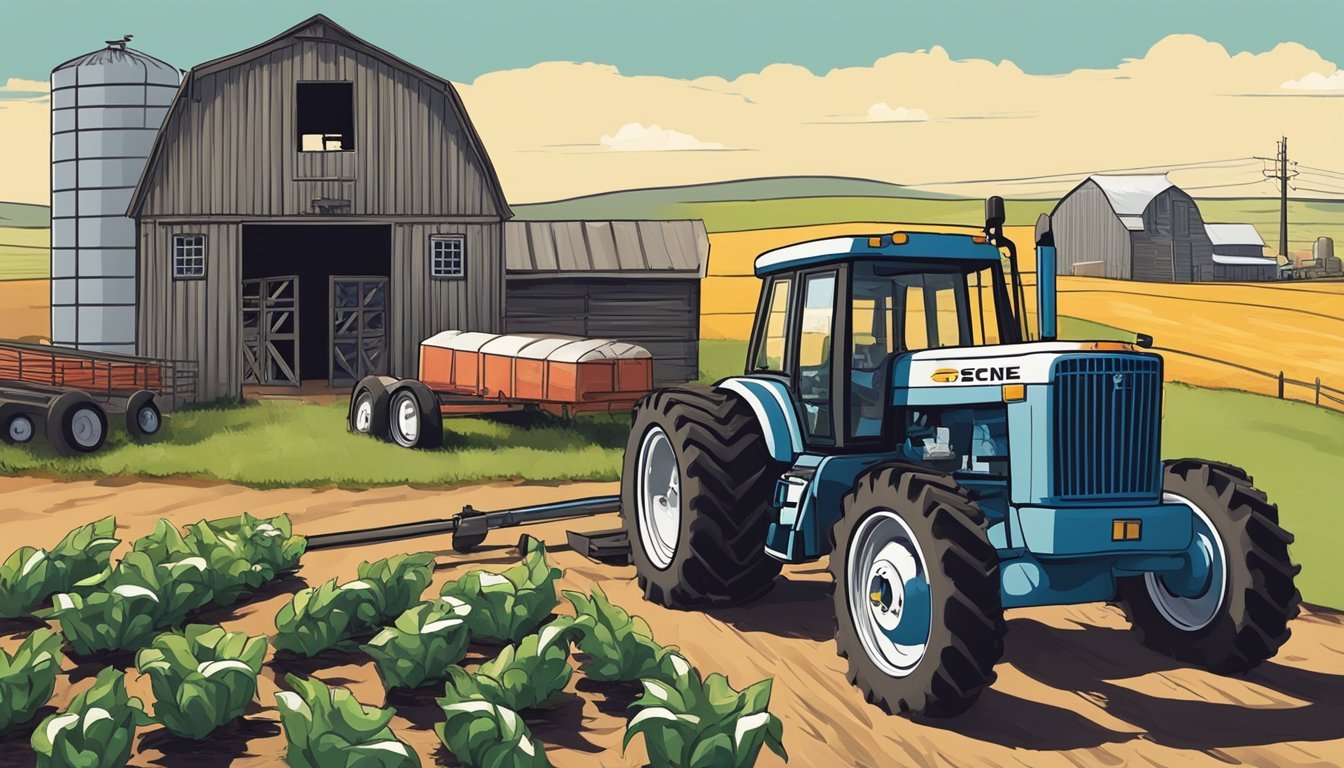Right to Farm Law in Colorado
Understanding Agricultural Protections & Limitations
In Colorado, the Right to Farm law serves as a legal shield for agricultural operations, protecting them against nuisance lawsuits. This legislation recognizes the critical importance of farm and ranch activities to the state's economy and cultural heritage. It ensures that as long as farming procedures are established and deemed reasonable, they cannot be challenged simply because new residents move to rural areas and find the operations bothersome.
The law does not, however, offer explicit protection to farmland itself or to family farmers specifically. Instead, it focuses on safeguarding specific types of agricultural practices that may produce noise, odors, or other effects that could impact neighboring properties. By doing so, the law implicitly supports the continuity of traditional agricultural practices against the pressures of urbanization and suburban sprawl.
Colorado's Right to Farm statute effectively balances the rights of agricultural producers to continue their livelihoods with the rights of neighboring landowners. It encourages coexistence in a state where agriculture remains a significant part of the regional identity, while fostering a legal environment that respects the inevitability of agricultural byproducts as a part of rural living.
Historical Context of Right to Farm Laws
In 1981, Colorado legislators passed the Right to Farm law, aimed at safeguarding the state’s farmland and agricultural heritage. The law was designed to protect Colorado’s farmers and ranchers from nuisance lawsuits, particularly from new residents who might relocate to rural areas and later object to normal agricultural operations.
The Rationale Behind the Legislation
The introduction of the legislation was fueled by the state's desire to:
Conserve and protect agricultural land
Encourage the development and improvement of agriculture for food production and other products
Impact on Agricultural Landscape
Since 1981: The number of farms in Colorado has grown by 43%, predominantly in the category of smaller farms.
Effect on Farmland: There has been a 5% reduction in farmland acreage, despite the increase in the number of farms.
Legal Framework
Colorado's approach to Right to Farm involves:
State law outlined in the Colorado Revised Statutes Section 35-3.5-101
Zoning and other ordinances enacted by local counties to offer additional layers of protection
At its core, Colorado's Right to Farm laws attempt to create a balance between the rights of agricultural producers and non-farming residents, ensuring the long-term viability of farming in the state. By establishing legal frameworks, the state underscores the importance of agriculture to its economy and the well-being of its rural communities.
Through these measures, Colorado affirms its commitment to both progress and preservation within the agricultural sector, thus reflecting a deeper understanding of the relationship between farmland stewardship and sustainable development.
Current Right to Farm Law in Colorado
Colorado’s Right to Farm (RTF) law is legislation aimed at protecting the interests of farmers and ranchers within the state. The Colorado Revised Statutes from sections 35-3.5-101 to 35-5.5-103 form the legal framework for these protections. The core of the law helps safeguard farmers from nuisance lawsuits by those who relocate to rural areas and subsequently challenge existing agricultural operations due to noise, odor, or other disturbances.
Recent Amendments and Support: In 2024, Colorado’s governor signed an unprecedented agriculture right to repair law. It grants farmers and ranchers remedies and clear rights to maintain, diagnose, or repair their own agricultural equipment. This law mitigates the farmers’ dependency on manufacturers and dealers for repairs and diagnostics, potentially reducing downtime and expenses related to equipment maintenance.
Scope of the Law:
Farmers and Ranchers have the right to perform repairs and acquire necessary diagnostic information for their equipment.
Manufacturers: This law challenges the traditional control held by equipment manufacturers over repair tools, software, and diagnostics.
Lawyers have interpreted the legislation as a critical memorandum of understanding between farmers, lawmakers, and manufacturers.
Legislative Support: Lawmakers aim to support the agricultural community by ensuring that the RTF laws adapt to the contemporary needs of the farming industry. This includes ensuring access to diagnostic tools and the ability to conduct repairs without undue restriction, providing autonomy that is necessary in time-sensitive farming operations.
This regulation represents a balance of interests, protecting farmers' right to a degree of self-reliance while still acknowledging the roles manufacturers and dealers play in the broader agricultural landscape.
Impact on Farmers and Ranchers
Farmers and ranchers in Colorado experience direct consequences as a result of the state's Right to Farm Law. Legislative Protections afford them a layer of defense against nuisance lawsuits that may arise due to the ordinary operations of their businesses, such as noise or odor complaints.
These protections enable farmers and ranchers to:
Maintain agricultural productivity without the constant threat of legal battles.
Focus on efficient farm management, knowing that standard practices are shielded by the law.
With the passage of the right to repair legislation, farmers and ranchers have gained autonomy over the maintenance and repairs of their equipment. This law affects several crucial aspects of agricultural operation:
Accessibility to Manuals: Farmers now have the necessary guides to undertake equipment maintenance.
Parts Acquisition: They are legally allowed to procure parts from sources other than original manufacturers, potentially reducing costs.
Repair Services: The flexibility to choose between various service providers can lead to competitive pricing for repair work.
Embedded Software: The legislation includes provisions that let farmers address issues related to embedded software in contemporary farm machinery.
Overall, these laws aim to support Colorado’s agriculture community by reducing downtime and helping control the costs associated with equipment repair and maintenance. As a result, farmers and ranchers are better equipped to manage their operations effectively and sustain the vitality of the state's agriculture industry.
Right to Farm vs Right to Repair
The distinction between the "Right to Farm" and the "Right to Repair" in Colorado lies in their respective focus on agricultural operations and the autonomy to service farm equipment.
Legal Distinctions
Right to Farm laws primarily protect farmers from nuisance lawsuits, enabling them to carry out normal agricultural activities without undue interference. These laws have an established history in preserving the rights of farmers to conduct their operations. Conversely, the Right to Repair legislation addresses farmers' legal rights to repair their own equipment. It allows farmers access to necessary tools, software, and diagnostics previously restricted by equipment manufacturers. This legislation pertains to intellectual property aspects like copyright, trademarks, and patents, ensuring that manufacturers provide the critical means for repairs.
Overlap in Principles
While distinct, both rights share a core value: enhancing farmers' autonomy. The Right to Repair empowers farmers by ensuring access to parts, manuals, and diagnostic tools, thus enabling them to repair their machinery without manufacturer intervention. It aligns with the Right to Farm's principle of allowing farmers to manage their agriculture operations with lesser dependency on outside services and influences.
Stakeholder Perspectives
Farmers benefit from both laws as they provide more control over their agriculture practices and machinery. Manufacturers, however, may argue that the Right to Repair affects their profits and intellectual property rights by providing third parties access to proprietary information. They also contend with potential safety and warranty issues linked to self-conducted repairs. Despite this, the push for the legislation indicates a shift in perspective prioritizing farmers' rights over manufacturers' restrictive service practices. With the Right to Repair, farmers in Colorado can undertake timely and cost-effective repairs, essential for the efficiency of modern agricultural operations.
Challenges and Controversies
The debate around Colorado's Right to Farm laws has unfolded against a backdrop of legal disputes and market dynamics. This section dissects the intricacies of deceptive trade practices, the monopolization worries, and the resulting legislative countermeasures that intertwine with the state's agricultural framework.
Deceptive Trade Practices
Colorado’s Right to Farm legislation has roused criticism for potentially enabling deceptive trade practices. Critics argue that certain language in the law may shield manufacturers and dealers of agricultural equipment from liability, raising concerns over the transparency and fairness of service and repairs. The law's interaction with copyright and trade secrets adds a layer of complexity, as farmers find themselves restricted from accessing diagnostic tools that are essential for modern, high-tech equipment like tractors and combines.
Monopoly and Market Concerns
The control over repairs and service of agricultural equipment has led to allegations of monopolistic behavior. Manufacturers are accused of imposing restrictive practices that limit the ability of independent mechanics to work on equipment, especially those with advanced emissions controls and technology. This centralization of repair services has raised alarms about the erosion of the free market and the subsequent impact on farmers' profits due to increased costs and dependency on authorized dealers.
Legislative Responses
In response to these challenges, legislation like the Consumer Right to Repair Agriculture Equipment Act has been enacted. Such laws are designed to dismantle the repair monopolies maintained by equipment manufacturers by granting farmers and independent repair shops access to necessary diagnostic tools and information. However, implementation of these laws has sparked further controversy among stakeholders about the balance between trade secrets protection and the right to service high-tech agricultural equipment.
Legal Enhancements and Amendments
Recent years have witnessed several significant legislative changes to Colorado's Right to Farm laws, aimed at reinforcing the protection and development of agricultural land and activities.
In a noteworthy legislative action, lawmakers passed the Consumer Right to Repair Agriculture Equipment Act, which exemplifies the state's commitment to support farmers. This act allows farmers to repair their equipment, which is essential for their agricultural operations.
Governor Jared Polis, a Democrat, has played a pivotal role in these legislative updates, often advocating for the advancement of agriculture within the state. His administration has seen a series of bills that foster a pro-agriculture environment. This is in alignment with Colorado's declared policy to conserve and encourage agricultural land development for various productions.
The Right to Farm law in Colorado has been subject to amendments reflecting bipartisan support, acknowledging the state's agricultural roots and future. Notably:
Amendments to the Right to Farm Law aim to limit recovery in nuisance actions to the loss of land value or a permanent injunction, provided irreversible damage has not occurred.
Legislation through the Senate has demonstrated support across party lines. This is evident from the significant majority by which the Consumer Right to Repair Agriculture Equipment Act passed.
While there can be multiple facets to these legal enhancements, the overarching intent remains constant: to nourish the agrarian fabric of Colorado by providing legal frameworks that back agricultural operations and land.
Comparison with Other States
Right-to-Farm laws are prevalent across all fifty United States, aimed at protecting agricultural operations from nuisance lawsuits. While Colorado enacted its Right-to-Farm legislation in 1981, other states have developed their own versions that shield farmers under similar principles but may differ in scope and application.
Florida, like Colorado, gives considerable protection to farmers, but it extends to allowing farmers to engage in alternative and innovative agricultural practices without the threat of nuisance lawsuits.
Maryland offers a strong defense through its Right-to-Farm law, providing that agricultural operations cannot be deemed a nuisance if they have been in existence longer than one year unless there is substantial evidence they negatively affect public health and safety.
In Missouri, the Right-to-Farm laws were fortified through a constitutional amendment, thus imbuing greater steadfastness in the face of challenges to agricultural practices deemed as nuisances.
Texas has a unique approach where counties can create "agricultural districts" that grant heightened protections to enclosed farms and ranches, fostering an environment where agriculture can coexist with expanding urban developments.
Contrasting this, Vermont maintains a more tailored approach, focusing on Good Agricultural Practices (GAP) as a defense against nuisance claims, emphasizing responsible farming operations.
New Jersey, on the other hand, utilizes an Agricultural Development Committee (ADC) to oversee and approve commercial farm operations and their protection under the Right-to-Farm Act.
State Unique Aspect of Right-to-Farm Law Florida Encourages alternative agricultural practices. Maryland Requires substantial evidence for nuisance claims against long-standing farms. Missouri Constitutional amendment strengthens protections. Texas “Agricultural districts” offer extra protection. Vermont Focuses on adherence to Good Agricultural Practices (GAP). New Jersey Involves an Agricultural Development Committee (ADC) in farm operation oversight.
While each state's Right-to-Farm law shares the common goal of protecting farmers, the nuances and administrative approaches can vary, reflecting the agricultural priorities and legal frameworks of the individual states.
Media Coverage and Public Opinion
Media outlets across Colorado have intensely covered the legislative journey and consequential passing of the state’s first “Right to Repair” law for farm equipment. Notably, news channels and publications such as the Associated Press and NPR reported on the pivotal moment, framing it as a significant victory for farmers who have long sought the right to repair their own equipment.
Coverage has primarily focused on the Consumer Right to Repair Agriculture Equipment Act and its passage with robust support, showcasing a clear interest in the discourse surrounding farming autonomy and consumer rights. Local public interest research groups, including CoPIRG, have actively campaigned in support of this legislation, suggesting a strong public interest in the issue.
The law’s passing was met with a positive reaction from many within the agricultural community. The consensus, as seen in news snippets and commentary, appears to reflect a shared relief among farmers who now anticipate more control over the maintenance and repair of their farm equipment.
Source Position Local Farmers Positive, recognizing increased repair autonomy Media Outlets (e.g., NPR) Informative, highlighting the law’s impact Public Interest Research Groups (e.g., CoPIRG) Advocative, rallying public support for the law
The broader public opinion seems to lean favorably towards these recent developments, as evidenced by the engagement and advocacy by various community and interest groups. However, detailed polling and analysis are not cited here, leaving some room for future investigation into the full spectrum of public sentiment.
Future of Right to Farm
The "Right to Farm" law in Colorado is poised at a complex intersection of technology-driven farming practices and evolving legal landscapes that seek to balance agricultural productivity with sustainability concerns.
Technological Advancements
Advancements in agricultural technology promise to significantly impact the Right to Farm laws. Innovations range from precision agriculture — the use of GPS and data analytics for efficient farming — to advancements in biotechnology for crop improvement. These technologies can boost production and optimize planting and harvest processes, potentially reducing disputes linked to farmland use by increasing efficiency and yield within existing parameters.
Legal and Regulatory Trends
Legislative trends indicate a heightened focus on providing farmers with greater autonomy. The passage of the Right to Repair Agriculture Equipment Act underscores a move towards ensuring that Colorado's farmers can manage repairs in-house, thereby reducing downtime and dependency on manufacturers. Future regulatory trends may also revolve around the implementation of emissions controls to align farming practices with environmental standards and amending the farm bill to address contemporary agricultural challenges.
Agricultural Sustainability
Sustainability is emerging as a central pillar in agricultural policy. In Colorado, Right to Farm laws may increasingly interface with regulations aimed at protecting land and water resources. Emphasis will likely grow around sustainable production methods that minimize environmental impact, with potential incorporation into the legal framework that governs agricultural practices. This may affect planting techniques, harvesting methods, and overall farm management strategies to align with sustainability goals.
The trajectory of the Right to Farm law will be shaped by how successfully it integrates these technologies, adapts to legal shifts, and embraces sustainability to safeguard Colorado's agricultural heritage.








